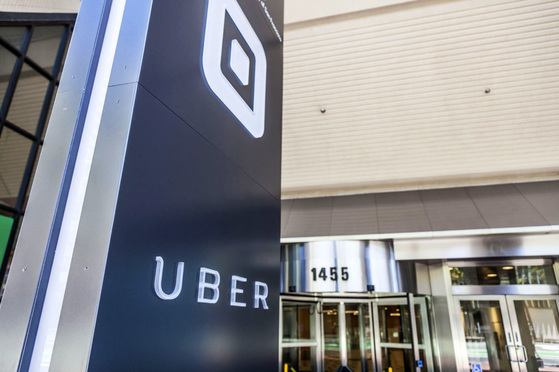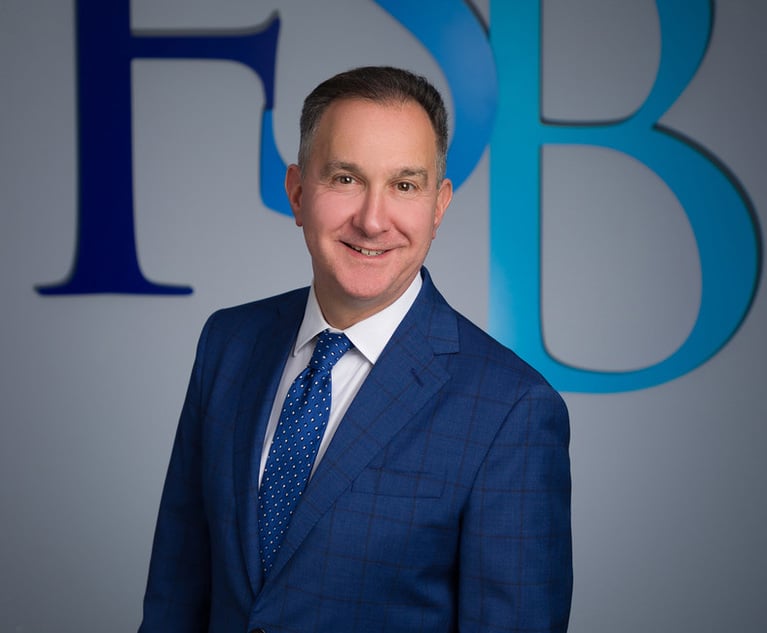NJ to Get $3.75 Million Share of Uber Data Breach Settlement
The settlement is the result of a multistate investigation that found Uber paid hackers $100,000 to conceal the breach, which exposed the names, email addresses, and cellphone numbers of 57 million users.
September 27, 2018 at 05:30 PM
5 minute read
The original version of this story was published on The Recorder

Uber on Wednesday agreed to pay a record $148 million in state and local penalties to settle allegations that the company intentionally concealed a major data breach in 2016 that exposed the personal information of 57 million people—including a $3.75 million share for New Jersey.
The settlement comes in the wake of a multistate investigation that found the ride-hailing company paid hackers $100,000 to conceal the breach, which exposed the names, email addresses, and cellphone numbers of those users. Uber did not provide public notice of the breach until a year after it happened in late 2016.
New Jersey was on the multi-jurisdictional investigation's executive committee, according to a release from New Jersey Attorney General Gurbir Grewal's Office.
“This is a significant settlement for New Jersey residents and for Uber users everywhere—not only because the payout is historic, but because it requires that Uber adopt new policies and procedures that will more effectively safeguard the personal information of its riders and drivers in the future,” Grewal said in a statement. “We're also sending a signal to other companies that ignoring consumers' privacy rights comes with a stiff financial penalty.”
The settlement is between Uber, all 50 states, and the District of Columbia.
The company's board of directors were in the dark about the ransom payment until it was discovered by a law firm last spring. The firm was hired to investigate the company's security team in a separate matter but stumbled on the breach during its inquiry. The board then hired a forensic firm to probe what happened with the breach.
Uber said in a November 2017 statement from CEO Dara Khosrowshahi that the breach was carried out by two hackers outside the company. The hackers accessed user data on a third-party, cloud-based service the company uses to store some information. They, however, were not able to download users' Social Security numbers, bank account information, credit card numbers, dates of birth, and trip history, according to the company.
The hackers were able to collect the names, email addresses, and cellphone numbers of the 57 million people that use Uber and the driver's license numbers of about 600,000 drivers, according to the company.
Uber eventually provided notice of the breach after an investigation, but that wasn't until a year after the breach and ransom payment happened.
Uber is based in San Francisco. California's share of the settlement is $26 million, which it will split with the San Francisco district attorney's office. DA George Gascon, who has frequently scrutinized Uber's business practices, joined the investigation into the data breach.
Becerra said Uber violated California laws requiring companies to secure customers' information and to promptly report data breaches affecting more than 500 people to the state Department of Justice. More than a quarter of the 600,000 Uber drivers who had their data exposed live in California.
The money will pay for more consumer enforcement actions, Becerra said.
“Anyone thinking about trying to evade the law, to skirt their responsibility to inform the public or law enforcement that a data breach has occurred … they better report it,” Becerra said. “Don't think that you can hide it and get away with it. You will find yourself in the same position as Uber did.”
Uber Chief Legal Officer Tony West said in a statement on Wednesday that they are working to improve safety and security after the breach and have hired new experts to implement those improvements. He said the company learned from its mistake in 2016. “Our current management team's decision to disclose the incident was not only the right thing to do, it embodies the principles by which we are running our business today: transparency, integrity, and accountability,” West said. “An important component of living up to those principles means taking responsibility for past mistakes, learning from them, and moving forward.”
The company's notice in 2017 launched a nationwide investigation into its conduct in the wake of the breach. California is one of several states that independently investigated the breach before teaming up with other states on the probe.
Uber has also promised to develop a new policy on data security that will assess the potential risk of another breach and implement improvements beyond what's currently in place. The company is required to hire an outside contractor to examine its security efforts regularly and recommend improvements.
Uber will also have to take additional precautions to protect any user data it stores on third-party platforms, such as the one hackers accessed in 2016. If there is another breach, employees must also have an avenue to report any ethics concerns they have about other employees. Those employees will also now be subject to stricter password guidelines to gain access to the company's internal network.
The settlement does not resolve any liability that Uber may have to consumers, Becerra said. Uber is still litigating claims related to the breach in multidistrict litigation before U.S. District Judge Philip Gutierrez in the Central District of California.
This content has been archived. It is available through our partners, LexisNexis® and Bloomberg Law.
To view this content, please continue to their sites.
Not a Lexis Subscriber?
Subscribe Now
Not a Bloomberg Law Subscriber?
Subscribe Now
NOT FOR REPRINT
© 2025 ALM Global, LLC, All Rights Reserved. Request academic re-use from www.copyright.com. All other uses, submit a request to [email protected]. For more information visit Asset & Logo Licensing.
You Might Like
View All

Tensions Run High at Final Hearing Before Manhattan Congestion Pricing Takes Effect
4 minute read
So Who Won? Congestion Pricing Ruling Leaves Both Sides Claiming Victory, Attorneys Seeking Clarification
4 minute read
Hit by Mail Truck: Man Agrees to $1.85M Settlement for Spinal Injuries
Trending Stories
- 1We the People?
- 2New York-Based Skadden Team Joins White & Case Group in Mexico City for Citigroup Demerger
- 3No Two Wildfires Alike: Lawyers Take Different Legal Strategies in California
- 4Poop-Themed Dog Toy OK as Parody, but Still Tarnished Jack Daniel’s Brand, Court Says
- 5Meet the New President of NY's Association of Trial Court Jurists
Who Got The Work
J. Brugh Lower of Gibbons has entered an appearance for industrial equipment supplier Devco Corporation in a pending trademark infringement lawsuit. The suit, accusing the defendant of selling knock-off Graco products, was filed Dec. 18 in New Jersey District Court by Rivkin Radler on behalf of Graco Inc. and Graco Minnesota. The case, assigned to U.S. District Judge Zahid N. Quraishi, is 3:24-cv-11294, Graco Inc. et al v. Devco Corporation.
Who Got The Work
Rebecca Maller-Stein and Kent A. Yalowitz of Arnold & Porter Kaye Scholer have entered their appearances for Hanaco Venture Capital and its executives, Lior Prosor and David Frankel, in a pending securities lawsuit. The action, filed on Dec. 24 in New York Southern District Court by Zell, Aron & Co. on behalf of Goldeneye Advisors, accuses the defendants of negligently and fraudulently managing the plaintiff's $1 million investment. The case, assigned to U.S. District Judge Vernon S. Broderick, is 1:24-cv-09918, Goldeneye Advisors, LLC v. Hanaco Venture Capital, Ltd. et al.
Who Got The Work
Attorneys from A&O Shearman has stepped in as defense counsel for Toronto-Dominion Bank and other defendants in a pending securities class action. The suit, filed Dec. 11 in New York Southern District Court by Bleichmar Fonti & Auld, accuses the defendants of concealing the bank's 'pervasive' deficiencies in regards to its compliance with the Bank Secrecy Act and the quality of its anti-money laundering controls. The case, assigned to U.S. District Judge Arun Subramanian, is 1:24-cv-09445, Gonzalez v. The Toronto-Dominion Bank et al.
Who Got The Work
Crown Castle International, a Pennsylvania company providing shared communications infrastructure, has turned to Luke D. Wolf of Gordon Rees Scully Mansukhani to fend off a pending breach-of-contract lawsuit. The court action, filed Nov. 25 in Michigan Eastern District Court by Hooper Hathaway PC on behalf of The Town Residences LLC, accuses Crown Castle of failing to transfer approximately $30,000 in utility payments from T-Mobile in breach of a roof-top lease and assignment agreement. The case, assigned to U.S. District Judge Susan K. Declercq, is 2:24-cv-13131, The Town Residences LLC v. T-Mobile US, Inc. et al.
Who Got The Work
Wilfred P. Coronato and Daniel M. Schwartz of McCarter & English have stepped in as defense counsel to Electrolux Home Products Inc. in a pending product liability lawsuit. The court action, filed Nov. 26 in New York Eastern District Court by Poulos Lopiccolo PC and Nagel Rice LLP on behalf of David Stern, alleges that the defendant's refrigerators’ drawers and shelving repeatedly break and fall apart within months after purchase. The case, assigned to U.S. District Judge Joan M. Azrack, is 2:24-cv-08204, Stern v. Electrolux Home Products, Inc.
Featured Firms
Law Offices of Gary Martin Hays & Associates, P.C.
(470) 294-1674
Law Offices of Mark E. Salomone
(857) 444-6468
Smith & Hassler
(713) 739-1250






